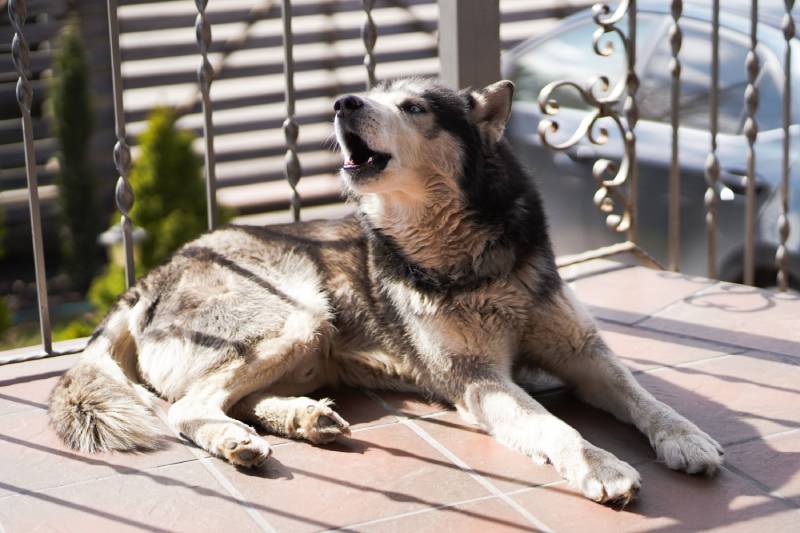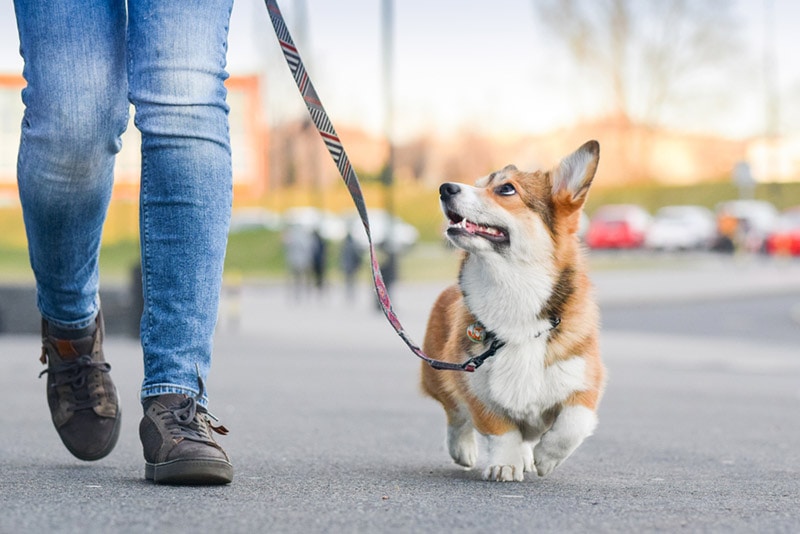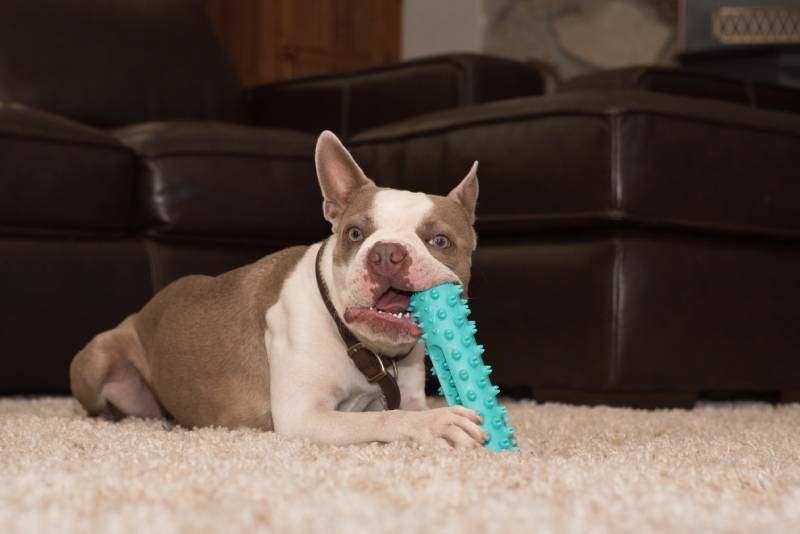How to Stop Your Dog from Barking: 9 Ways That Work
Updated on

All dogs like to bark from time to time, but some tend to do so excessively, which can be annoying for everyone in the household and maybe even neighbors. Fortunately, there are a few things that you can do to get your dog to stop barking. The first step is to understand why your dog is barking so much. Then, you can move on to figuring out how to make it stop. Here’s what you need to know.
Click to Skip Ahead:
Common Reasons That Dogs Bark
Dogs bark to communicate with other dogs and humans, and their barking can mean different things in different situations.
- Loneliness — Dogs are instinctively pack animals, and they wouldn’t live alone if they had something to say about it. If a dog is stuck at home by themselves, they may become lonely and even depressed. Once these feelings develop, they might try to relieve their discontent by excessively barking.
- Boredom — Dogs don’t like to sit around doing nothing all day. They are active animals that enjoy playing, exercising, and exploring. If your dog is bored and has nothing else to do, they may resort to barking, which releases pent-up energy and attracts attention.
- Protection — Dogs tend to bark when they feel that they or their companions are being threatened in some way. They might bark excessively if people are making noise outdoors, strangers are in the area, or threats are perceived in public spaces.
- Fear — Some dogs bark excessively when they get scared or startled. For example, an object might fall over in the house and spook them, or a car outside might honk and freak them out.
- Seeking Attention — When a dog does not feel like they are getting enough attention from their human or dog companions, they might bark until they get the reaction that they are looking for.
- Playfulness — Usually, younger dogs like to bark excessively when they get carried away with playing, especially when they are roughhousing with kids.
- Separation Anxiety — Some dogs feel insecure when they are alone, which can lead to excessive barking due to separation anxiety. If this is the case, other behaviors like marking the house, pacing, and chewing on furniture tend to accompany the barking.
Some dogs bark for many different reasons, which can make dealing with this behavior challenging because the barking tends to go on throughout the day no matter what’s happening. Therefore, more than one solution may have to be employed to get the results that you want.
The 9 Ways to Stop Your Dog From Barking
1. Invest in More Exercise Time
Providing your dog with opportunities to get more exercise each day can help reduce their problem barking. The extra exercise will get rid of pent-up energy so your dog doesn’t feel the need to bark unless necessary. It can also relieve stress that might have developed due to problems like separation anxiety. Try adding an extra 10 minutes of exercise to your dog’s day, more if they seem to have pent-up energy from spending time at home.

2. Commit to Socialization
If your dog tends to bark in public when there is no need for them to, making it a point to socialize them in controlled settings can help ease the situation. One effective way to do this is to ask a friend to bring their dog and kids over to your house. The more socialized your dog is, the more comfortable and confident they will feel in social settings that are unfamiliar to them. In turn, this should result in less unwanted barking.
3. Keep Your Dog Busy at Home
If you’re dealing with a dog that likes to bark inside the house, whether you are home or not, provide them with a puzzle or interactive toy to enjoy throughout the day. It can provide engaging fun that stimulates their brain and keeps them from even thinking about barking. Good toys can help keep your pet busy all afternoon.

4. Train Them
Consider teaching your dog the “quiet” command to stop them from barking while you’re with them. To do this, you must use a stern yet quiet and reinforcing voice and say, “quiet,” whenever your dog barks and you want them to stop. When they stop barking to pay attention to you, reinforce the behavior with a treat or clicker. Eventually, your dog will know that the word, “quiet,” means to quit barking.
5. Ignore Them
Some dogs might bark to try to gain your attention. If this is the case in your household, you may have luck getting your dog to stop barking by simply ignoring them until they stop the behavior. Whenever they bark for attention, don’t give them any until they quiet down. Soon, they will learn that barking doesn’t work and that good behavior is the only way to get quality attention.

6. Remove the Barking Motivation
There are various ways that you can remove the motivation for your dog’s barking at home. For example, if they bark when they hear the doorbell ring, put a note on your door asking visitors to knock instead, or disconnect the doorbell altogether. If your dog likes to bark excessively at passersby through a certain window, keep the curtains closed during high foot-traffic hours.
7. Claim What’s Being Barked At
Whether your dog is barking at an object or a person, you may have success in getting them to stop barking by claiming the object or person yourself. Use your body to create a physical barrier between your dog and the object or person. Use your voice or hands to communicate your claim with intention. You may have to practice this technique before your dog catches on to what you’re doing. However, once they do, claiming the person or object at any time should help reduce, if not eliminate, unwanted barking.

8. Avoid Reinforcing the Barking Behavior
While it’s important to reinforce good behavior when your dog stops barking on command, it is just as vital to avoid accidentally reinforcing the barking. For example, if your dog barks whenever someone comes to your front door, encouraging them to go say hello while they are barking signals to them that you don’t mind the barking. Always discourage the behavior, but be careful not to use negative reinforcement in the process.
9. Consider Working With a Pro
If you find that it’s overwhelming to get your dog to stop barking or the techniques that you try don’t create the results that you are looking for, you might be better off working with a professional trainer. They can help teach your dog when it is and isn’t okay to bark and provide you with guidance on how to manage your dog’s barking once training has been completed. The other options highlighted on this list can be paired with professional training for optimal results.

Final Thoughts
Dogs do bark, but that doesn’t mean you need to put up with excessive or inappropriate barking. Several different techniques can be used depending on the reason for the barking and personal preference. Hopefully, you will find that at least one of the techniques outlined here works wonders for you and your dog!
Related Reads
Featured Image Credit: Dmitri T, Shutterstock












